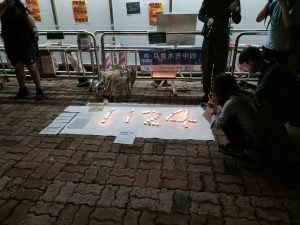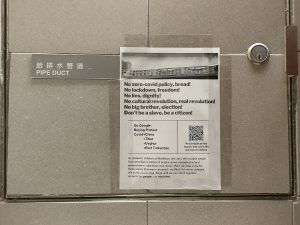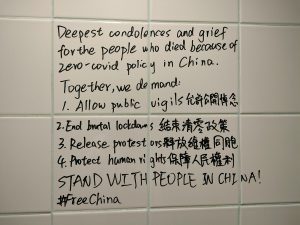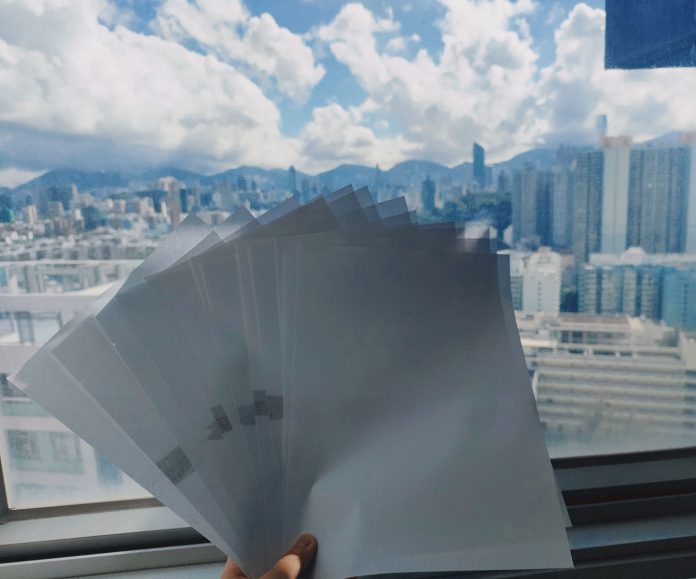Protesters who joined the White Paper Movement two years ago stay silent now.
By Della Qing
University student Skylar Ho avoids news about politics and social issues in China, despite having joined the White Paper Movement protests during the COVID pandemic.
“Nowadays, I read less news related to social issues. I do not look for news to read. I only read the news when I come across stories on Instagram. Then I still read the entire report carefully,” Ho says.
“I’m about to graduate. This semester I have no class. I feel like I’m living the life of a “lonely senior”. Every day I cook for myself. I am working on my dissertation. I read books, and watch movies and TV series. I also do exercise for an hour every night,” Ho adds.
In November 2022, thousands took to the streets across China to protest against the government’s zero-COVID measures. Students from different universities in Hong Kong gathered at the Chinese University of Hong Kong campus to protest. Holding white papers, students shouted slogans like “Long Live Freedom” and called for press freedom. Ho was one of them.

“I followed news about the pandemic and protests closely at that time. I read and reposted angry messages criticizing the lockdown policy in China on Instagram. I think at that time we were in a powder keg about to explode,” she recalls.
“When the protest started in different cities, I spotted many messages about young people holding white papers in the protest. We had the same feeling and our hearts were connected no matter where we were,” she adds.
Ho shares she stays silent most of the time now.
“I’m now less passionate, brave, and idealistic than in 2022. The thought of ‘nothing can be changed’ haunts me, especially when the cost of speaking out is getting higher and higher. Considering the potential risks, I prefer to stay silent. But I’m still thinking about social issues, and I chat about these with my friends,” Ho says.
“In China, the media is the mouthpiece of the government. I think the government is trying to edit people’s memory by preaching the fairy tale of prosperity and solidarity. They do not admit that they made tons of mistakes during the pandemic era, causing many deaths,” she sighs.
Another postgraduate student Chloe Song, who also joined the Whiter Paper Movement protest shares Ho’s depressing feelings.
“I still remember the experience of being trapped in a lockdown in Shanghai. I felt so depressed that I couldn’t sleep all night. I cried when I was lying in my bed. It’s like I was sentenced to prison. I knew maybe someday I would be released, but I couldn’t help but dwell on the tragic fact that I was in prison,” she recalls.
Song still reads news to learn what is happening in the world.
“I think it’s understandable that Chinese media outlets remain silent on issues related to the pandemic now because they are subject to strict censorship. I think this shows there is no systematic change despite many speaking out during the White Paper Movement,” the business major student adds.
“I have been hiking with my friends in Hong Kong recently. So far, I have completed hiking MacLehose Trail. I feel that when I am walking on the trails, I seem to be closer to Hong Kong. Also, I can experience the joy of sports while doing so,” Song says.
“I talk about social issues with my friends. I think the most fortunate thing about coming to Hong Kong is that I have met some friends whom I can talk freely with,” she adds.
The 24-year-old student points out that the protest highlights the fact that the people have no say in public governance.
“I don’t think that the zero COVID policy was lifted because of the protests. The movement failed to make changes on a national level. The social and political structure remains the same,” she sighs.
“I think leaving China is the best option, as there is no sign of change. Someone who was arrested during the White Paper Movement said to me: ‘Slaves cannot become citizens with civic awareness unless this generation of slaves fades’ after being released. This friend of mine has applied for political asylum in another country,” Song says.
Despite feeling hopeless about the future, the business major student also shares that she at least had the chance to speak up about social issues and has made friends with many like-minded people during the protest.
“It was an unforgettable experience for me. If the movement happens again, I will still take part in it but will think twice about safety,” she says.
Another student, Finley Sun, is about to graduate and is worried about job hunting.

“I still have a lot of things to do for my final year project and course assignments. I’m completely overwhelmed. I have no time to look for a job,” Sun says.
“I now focus on my own life. I mainly think about what to eat, when to meet my friends, when to turn in my homework, and how to plan my practice before the next running race. I still discuss social issues with friends sometimes, and I read and repost news on Instagram, but not as frequently as I did during the pandemic,” she adds.
Sun joined the protest at a Hong Kong university campus in 2022. She also held a piece of white paper in Prince Edward Station on 1st December 2022 with her friend, and they were intercepted by Hong Kong police.

“The police warned us saying we were involved in unlawful assembly. But later on, I checked the related ordinance, and I found out the law actually states the number of participants should be three or more. Obviously, we did not break the law. The police were just bluffing,” she says.
In January 2023, Chinese police officers visited her home in Mainland China looking for her.
“But they didn’t pursue the case when they could not find me. I guess they saw my immigration record and thought I was home. After one or two weeks, my mom received a call from the police and asked her to have a chat with the officers,” Sun recalls.
“The police officers didn’t tell my mom about the details. I think they only knew my name and what I did, but they didn’t have any proof. So I just denied everything. They also did not further investigate,” she says.
“The police just took some notes and kept the arrests for 24 hours in detention. It was more like a warning. I will do it again if I am put in a similar situation. I can afford this cost, ” she says.
Sun flew to Kaohsiung and watched An Unfinished Film on December 30, 2024 alone. She cried at the end. This movie reminded her of the traumas she went through during the pandemic.
The film, directed by Lou Ye, a Chinese screenwriter and director, is a record of lockdowns that began in Wuhan in early 2020.
The film, which won the 61st Golden Horse Best Narrative Feature alongside Best Director, has not been released in China, and information about it is banned behind the Great Fire Wall in China.
“What impressed me most is that this movie is a collection of videos about the pandemic, which were posted by ordinary people and went viral online. They were deleted by authorities. At the end of the movie, there is a line saying ‘Thanks to all the people who filmed these untraced and deleted videos’,” Sun says.
Edited by Cathleena Zhu and Emma Wei
Sub-edited by Celina Lu







































